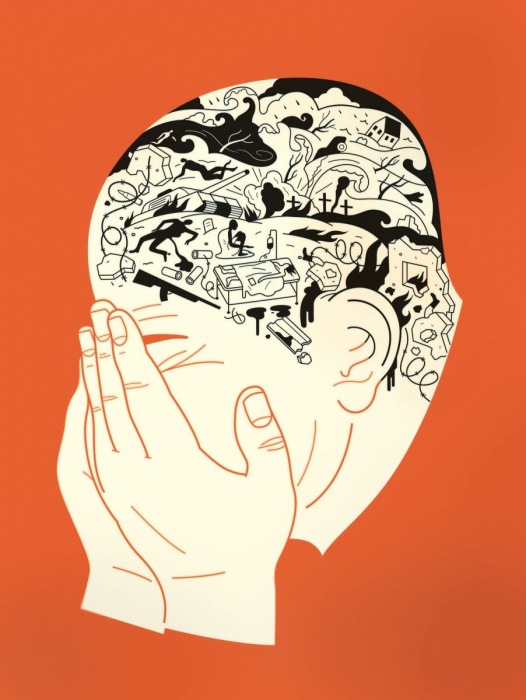Empathy is the ability to feel the state of another person as one’s own. Empathic heart feels that the interlocutor inside, perceives the world through his eyes, recognizes other people's emotions.
Important points:
- Empathy is manifested in the "infection" of the emotional or sensorimotor state of another person. It is expressed with various strengths - from immersion in the world of feelings to self-identification with the individual. In the first case, the empathy is aware of reality, understands that he is experiencing other people's feelings. In the second, it merges with the personality, blurring the boundaries.
- Each has its own threshold of sympathy - some rush to the rescue, pushing back their own affairs. Someone acts according to the situation - with what he could, the more he helped. Others are relatively indifferent, control emotions, because: “they use me again”, “have already suffered”. Some do not care. Such people are a dangerous category. The anti-empaths are interested in the ego, they do not know how to see the world through the eyes of others.
- Empathic skills in people since childhood. As they grow older, they gain life experience, learn to recognize the feelings of others, empathize.
Interesting fact! Using magnetic tomography, scientists have established - empathy for other people's pain, and their own pain sensations activate the same parts of the brain. For empaths, alien, imaginary pain is as excruciating as its own.
Material Content:
What is empathy, where does it come from
The term comes from the Greek empatheia, which means empathy.

The idea of identifying individuals with high sensitivity belongs to the American psychologist Elaine Aron. In her opinion, the brain of 15-20% of people otherwise processes sensory impulses.
Empathy in psychology is described as a projection of oneself on the interlocutor. Sigmund Freud's definition:
“We take into account the patient’s mental state, put ourselves in this state and try to understand it by comparing it with our own.”
Empaths more often “hear” close relatives, and the ability to “feel” an outsider is less common.
Classification and Levels
In psychology, the following types of empathy are distinguished:
- Emotional It is characterized by a keen perception of feelings. People note mental pain similar to the feelings of the interlocutor. A deep understanding arises. With the participation of empathy, the problem loses its importance, its acuteness.
- Cognitive. Intelligent assessment of the feelings and actions of the opponent. The helping party first understands the negative attitudes, then reveals the possibilities of the individual. Psychologists use the cognitive method.
- Predicative. It manifests itself in the ability to predict the mood and feelings of people over time. Empath seeks to predict events, facilitate the mental state of the interlocutor. This quality is indispensable in family and business.
It is interesting! Psychologists consider emotional empathy an innate ability, it is observed in infants. Cognitive appears later. It is recommended to develop from the age of three.
There are four levels of empathy:
- Low. People are guided by logic, real facts. Impulsive actions are unusual. They don’t understand the feelings of others, they evaluate other people's problems through their position. Lack of empathy is more common in men.
- Normal. The level characteristic of most. People recognize the emotions of others, but they show little empathy, do not think about the hardships of others, remain indifferent. Sensitivity is present only in relation to the close environment.
- Tall. This is empathy. Perfectly “feel” people, listen carefully, notice the details. Empathize without experiencing discomfort and anxiety.
- Elevated. The maximum level causes a lot of inconvenience. There are difficulties in identifying, separating other people's problems. Excessive vulnerability, sensitivity appears. Empath literally “lives” the feelings of other people, feels guilty for their pain, suffers with them.
Characteristic manifestations
Have you found yourself in a situation when a friend suddenly called with a question: "How are you feeling?" And you really suffered from a severe bruise or a sudden exacerbation of the disease in these minutes. If this happened, you were faced with an empath who “felt” your pain as his own.
Space is riddled with energy waves. There is a connection between people that is not subject to human vision, and sometimes to reason.

Signs indicating that you are empathic:
- Acutely react to the tragic news of troubles and disasters, feel the suffering of random people, not knowing what happened. You feel, refracting someone else's pain through your own "I".
- Prefer to listen rather than talk. Not facts are of interest - emotions are important.
- Strangers trust secrets, seek support. On a subconscious level, they “feel” that you are the one who can understand and help.
- You get tired in busy places from the emotional flow of the crowd. It takes time to "recover."
- Sensitive: you react painfully to bright light, loud sounds, strong odors.
- Nature is close, you feel positive, clean energy. Animals feel you.
- Intuition "sees" falsehood, falsehood, deception.
- Try to help everyone.
Important! It is believed that one in five is endowed with such a gift to varying degrees. Many do not even suspect about him or suppress the "difference".
Advantages and disadvantages
Empathy is a difficult gift. It is important to control it. A continuous stream of other people's emotions is a big load.Not having a strong character, stable psyche, mature mind, living is not easy.

An oversensitive person feels uncomfortable when:
- faced with hypocrisy;
- hears insincere compliments for practical gain;
- sees a game for the public, unceremonious attention-grabbing, rude, tactless behavior;
- feels envy in a stream of amiable mock phrases;
- compromises with personal moral principles.
The benefits of empathy include:
- prospects in the profession;
- assistance to close circle;
- loyalty to other people's flaws;
- inability to be deceived, to be deceived;
- ability to prevent, extinguish conflicts.
A person’s ability to understand without words, to capture the nuances of people's condition is tiring and devastating.
Important! Hyperempathy is dangerous at the psychological and energy levels.
The negative side of high sensitivity brings:
- mood swings;
- insomnia
- communication problems;
- worries about the lack of similar altruism in your address;
- the feeling of “playing with one goal” that kindness is used;
- risk of mental problems due to a permanent feeling of anxiety.

Doctors, psychologists, volunteers, social workers are constantly in contact with other people's misfortunes. High sensitivity threatens them with burnout syndrome.
Psychometric Diagnostics
The first manifestations of empathy are noticed in infants. Laid by nature is formed under the influence of education, lifestyle.
Psychometric tests are used to determine the level:
- Boyko test for empathic empathy;
- diagnostic questionnaires of Yusupov, Kosonogov.
To evaluate how a particular person perceives other people, one type of testing or a combination of them is used.
Empathy development
It is often said: "He is a born psychologist." Such a phrase indicates the ability to empathize emotionally, without professional skills.
Empathy can be developed. Even from zero point, if you constantly train, practice strengthening energy.
To do this, use:
- affirmations;
- meditation
- holotropic breathing.
Verbal formulas will set the mind, meditation - the soul. Cognition of the world begins with oneself. Breathing technique will heal from psychological injuries and attitudes.

Close communication with children and animals is the best “teacher” in the development of empathy. Kids and animals have no pretense, their feelings are clean, easy to read.
Intuition and empathy are one. The brain perceives them identically, so develop intelligence, listen to the inner voice, trust forebodings. Remember the sensations when meeting new people. Analyze dreams. Dreams tell about our "I", that beyond, in invisible spheres.
Such exercises raise the energy level, exacerbate sensitivity.
How to control
The heightened sensitivity is fraught with emotional breakdowns.
Follow the rules of correction:
- When the heart is full of other people's experiences, concentrate on abstract thoughts, count to one hundred. Or stop the dialogue and leave. Silence to calm down.
- For unpleasant physical symptoms, examine the pain points. If your head hurts, your neck aches, you feel discomfort in your stomach - put your palm there, direct the flow of love to yourself.
- Concentrate on breathing. Listen to inhale and exhale.
- Use emergency meditation. Find a place for solitude, focus on positive thoughts.
It is important that you get the feeling that you are only experiencing your emotions, there are no others.
Advice! Think about who you empathize with, learn to empathize consciously. Not renouncing the ability to perceive others, do not let someone else's negative into the soul, turn off empathy at the subconscious level. Help, but do not harm yourself.
Energy protection
You can protect yourself from negativity while maintaining sensitivity. How to do it:
- Visualize an invisible defense: imagine a shield or a white sphere that does not pass negative flows. In severe cases, think of a huge black panther protecting the energy field from intrusion.
- Do not be afraid to refuse, learn to say “No”, stop talking.
- Keep your distance. Feel free to move away from the unpleasant person.
- Filter out other people's emotions, do not let them into consciousness.
- Avoid people with a negative attitude who want to get rid of emotional trash.
If you can’t ignore the influence of others on your own, consult a psychologist.
Examples in different areas of life
There are many illustrations to describe in simple words, how we resonate with the feelings of others:
- Response to someone else's pain. A person sees a stranger pierce a finger with a needle to take a blood sample for analysis. In the sensory cortex receiving signals, the same imaginary sensation arises. When the motor cortex is activated, the arm twitches involuntarily.
- The passenger sees a dog running dangerously across the road and tries to “press” the brake pedal.
- Another example is when an individual is engulfed in a riot of mob.
- When "infected" with an emotional state, the baby cries, because another child is crying nearby.
Empathy usually forms a family relationship, communication, or long relationship. Oxytocin, the hormone of affection and friendship, affects the resulting empathy. It is produced by lovers, it is excreted during breastfeeding. The baby receives a hormone with breast milk. The same security and peace arise along with loved ones.
Make life better
If you are a susceptible person, and hyperempathy is tired of it, change your angle of view - nature has gifted you with superpower.
You are a telepath. No need to study the nuances of the behavior of others, to recognize the language - the brain reads the emotional state of those standing nearby. The thoughts of others are available, you understand them as yourself. Feel when a loved one feels bad.

People often find it difficult to understand themselves: they do not distinguish fear from anger, anger from resentment, dissatisfaction from envy. And you do it.
You can change the world around you. Surrounded by negative people is hard: oppresses an unpleasant conversation, an uncomfortable atmosphere. But it’s you who discharge the heat: having supported, “laid out on the shelves”, saying the right words. Empathy works in both directions. You perceive emotions and spread around you, make life better.
Why not use superpowers for your own benefit? Understand what leadership wants - it's easier to build a career. Instinctively choose with whom to chat - useful contacts appear.
Discover the psychotherapist. You subtly feel what your neighbor needs for balance - so help him in this.
Empathy will ease the dilemma. If you choose a profession, a city for moving, an apartment, a hobby, a life partner - listen to intuition. The best choice has already been made; it is within you.












